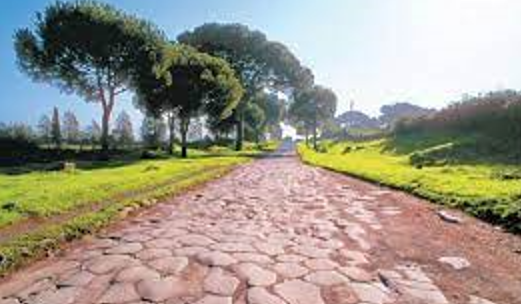
Journey to Rome
“After all this had happened, Paul decided to go to Jerusalem, passing through Macedonia and Achaia. “After I have been there,” he said, “I must visit Rome also.” ” (Acts 19:21)
Just as Acts 1:8 alludes to the entire book of Acts, so Acts 19:21 alludes to the grand chapter of Acts, 19:21-28:31. Paul is preparing to go to Rome by way of Jerusalem. He chooses a journey through European Macedonia and Achaia, which have been mission fields so far. He has walked the path of suffering and death so far. It was foreseen when God chose him. It can be assumed that Paul sent two people he trusted, Timothy and Erastus, to prepare a fundraising for Jerusalem.
Demetrius commotion
The Temple of Diana in Ephesus is one of the Seven Wonders of the Ancient World. Diana is the Latin word for the Greek word ademy. In Ephesus, however, the goddess of fertility in Asia Minor, the “Great Mother,” was worshiped under this name, not the virgin goddess of the hunt. The image used in their worship stood in the deepest part of the temple. So it was a big business to duplicate the idol that anyone could easily own. This reminds me of Bar-Jesus, the foolish local false prophet mentioned in Acts 13:6-8, linking his religion to his profession. In verse 27, the author of the Acts of the Apostles mocks idols and related religious businesses in a subtle ironic way.
Religious businesses and crowd psychology incitement
When Paul warned of the seriousness of idolatry being made in this area and taught how futile it was, members of the so-called idolatry gathered a crowd to silence Paul in order to maintain their business. They instigated that they would shake the foundation of their faith in Artemis, which they had kept, while repeating the words of Paul, “The things made by human hands are not gods.”
When all the crowd joined them, and the whole city was in an uproar, they seized Gaius and Aristarchus, Paul’s companions, and took them to the theater at Ephesus. The theater could accommodate more than 24,000 spectators. It was a place where people came when they were dissatisfied and voiced their protests out loud.
A helping hand in danger
Paul tried to enter the theater to defend the two men, but his disciples and some sympathetic officials prevented him from entering the scene of the commotion and suffering. The people who gathered at the place of this disturbance did not know exactly why they were gathered. If you look at each other’s words, you can see the ruins caused by crowd psychology. In the midst of this, the Jews, like Christians, opposed idol-making, so they feared that they would be scorned together, so they sent out a man named Alexander. The crowd had been screaming for two hours without knowing why, saying, “Great is Artemis of the Ephesians!”
The chief of Ephesus calmed and persuaded the crowd. Chief Secretary is the official title of a high-ranking official in the city of Ephesus. He warned against the riots of the crowd that the Roman magistrates might be invoked (v. 40). Ephesus took on the honorable name of ‘guardian of the temple of the goddess Artemis’. The chief clerk warned the crowd not to force himself, as he could proceed with the case justly through legal process. The judgment passed by the Chief Clerk upon the Christians and the whole matter was recognized as important in Luke’s eyes. For it has repulsed the erroneous practice which always seeks to harm Christians by accusing them of sedition.
Think about
The boundaries of missions, which God commanded in Acts 1:8, are expanding day by day. Paul continues to move forward through twists and turns. Sometimes it may be hopeless enough to see the front, but at other times, it is also confirmed that God’s helping hand is visible. We are now on our way to Rome. While foreseeing that there will be difficulties, he is boldly advancing. With what mind are we participating in the missionary journey of Apostle Paul and his company?
President Sung Jin Lim
World Mission University
